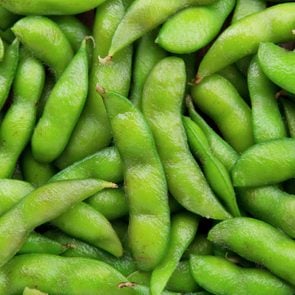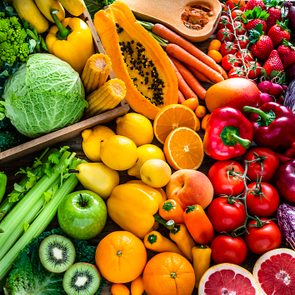5 Tasty Vegan Burgers Everyone Will Love
Updated: Feb. 19, 2021
Looking for a delicious vegan burger? Registered dietitian and plant-based diet specialist Cynthia Sass shares her top five favorite vegan burgers, and why they're a good protein option for plant-based eaters and omnivores alike.
Our editors and experts handpick every product we feature. We may earn a commission from your purchases.
The rise of the vegan burger
Vegan burgers are getting better every day, and they’re pushing plant-based products to new levels of popularity and acceptance.
About 16 percent of consumers regularly use plant-based alternatives like veggie burgers, even though 89 percent of those people don’t categorize themselves as vegans or vegetarians, according to The NDP Group’s 2019 report, Eating Patterns in America.
In other words, plant-based substitutes are becoming increasingly acceptable to a broad range of people. (Here’s how to start a plant-based diet.)
More people are cutting back on meat
That statistic makes sense, given the growing trend of semi plant-based eating among consumers in the United States. A January 2020 Gallup poll found that 23 percent of Americans reported eating less meat in the previous year.
Meanwhile, a 2018 study published in the journal Public Health Nutrition found that two-thirds of U.S. adults surveyed were purposefully eating less red and processed meats compared to the previous three years.
The wider availability of plant-based options has made them more accessible across the country. And newer formulations offer tasty burgers and other products that may actually be preferred over meat.
A 2017 survey from consumer research group Mintel found that taste was in fact the top reason shoppers choose plant-based protein alternatives. This was followed by an interest in protecting animals and the environment, and improving health and well-being.
(These are the meat substitutes I recommend.)
Health benefits of eating more plant-based protein
A switch to more plant-based options may indeed offer key health benefits. In a 2021 study published in the Journal of Hypertension, scientists looked at the impact of a standard control diet on blood pressure, compared to seven different plant-based diets, some of which included small amounts of animal foods.
Researchers concluded that a higher consumption of plant-based diets, even with limited animal products, may help reduce blood pressure. They predict that the switch could result in a 14 percent reduction in strokes, a 9 percent reduction in heart attacks, and a 7 percent drop in overall mortality.
Another plus: A diet high in plant protein may lower the risk of all-cause death. A JAMA Internal Medicine study, published in 2020, looked at data in more than 400,000 people in the U.S. over a 16-year period.
Scientists found that a higher consumption of plant protein was linked to a lower risk of death from all causes. The connection was particularly strong for heart disease, which remains the leading killer in the United States.
(Learn more about the health benefits of a vegan diet.)
How veggie burgers may impact health outcomes
If you’re wondering how specifically replacing a beef patty with a plant-based alternative may impact your health, researchers at Stanford University looked at just that.
In a 2020 study, published in the American Journal of Clinical Nutrition, people were asked to consume two or more servings per day of either animal protein (mainly red meat) or the plant-based brand Beyond Meat for two months. They were asked to keep all other foods and drinks as similar as possible. They then consumed the reverse pattern for another eight weeks.
Scientists found that compared to meat, Beyond Meat consumption improved heart disease risk factors. These included a reduction in “bad” (low-density lipoprotein) LDL cholesterol, modest weight loss, and lower blood levels of trimethylamine-N-oxide (TMAO), a compound linked to blood vessel inflammation.
Note: This Stanford study was funded by Beyond Meat, but researchers say the company was not involved in the design or execution of the study, and didn’t participate in the data analysis.
(Beware of the vitamin deficiency vegetarians and vegans may face.)
How to select a healthful vegan burger
These days, there are options for everyone, from those who want a burger that looks and tastes as much like meat as possible, to those who prefer an earthier patty.
As a registered dietitian, I also have three nutrition-focused criteria for selecting the best product. First, look for brands made with fairly simple, straightforward ingredients. You may see a term like methylcellulose, which is a plant ingredient used to hold vegan burgers together, but you shouldn’t have to look up multiple ingredients, or struggle to pronounce them.
Next, opt for products with at least 10 grams of protein. If your vegan burger is taking the place of meat, this is the minimum amount of protein it should provide, but some patties can pack 20 grams or more. For comparison, three ounces of grilled skinless chicken breast contains about 25 grams of protein. (Also, try this high protein vegan recipe.)
Finally, I recommend options free from wheat/gluten and processed soy, since many people need or prefer to avoid these additives. Fortunately, there are now several high protein options made primarily from pea protein, sourced from yellow split peas, which isn’t a common allergen.
(Check out these plant-based fast food options that taste delicious.)
Top tasty and healthy vegan burgers
Here are five vegan burger products that meet my standards, and a few notes on ingredients and nutrition facts. (These are the best plant-based protein sources.)

Beyond Meat
$5
This meaty vegan patty can probably fool most beef lovers. In addition to earning major points for the Stanford research, Beyond Meat scores big on flavor and texture. Each non-GMO burger packs 20 grams of protein and 20 percent of the Daily Value (DV) for iron, along with 18 grams of fat, and 5 grams of carb with 2 grams as fiber.

Dr. Praeger’s All American Veggie Burgers
$5
This burger from Dr. Praeger’s is one of my favorites based on its ingredients. The recipe combines pea protein with heart-healthy avocado oil, and veggies, including sweet potato puree, butternut squash, and carrots. It looks and tastes more like a true veggie burger, rather than a meat imposter, but it’s no less satisfying.
One patty provides 22 grams of protein and 30 percent DV for iron, in addition to 12 grams of fat and 10 grams of carb with 6 grams as fiber (21 percent DV).

Trader Joe’s Protein Patties
$4
Sold in the refrigerated section of the store, these pea protein burgers from Trader Joe’s are made with a fairly short list of ingredients that includes sunflower oil, beets, and oat fiber.
One patty provides 18 grams of protein, 20 percent DV for iron, 20 grams of fat, and 11 grams of carb with 5 grams as fiber.
It’s worth noting that Trader Joe’s also makes a frozen Hi-Protein Veggie Burger I personally love, with a texture that’s similar to falafel. It’s ideal for people who want a high protein (26 grams) gluten and soy-free vegan patty that doesn’t resemble meat. I enjoy it baked in the oven, which leaves it crisp on the outside and tender on the inside.

Big Mountain The Original Veggie Patty
$9
This female-owned Canadian brand, Big Mountain, is available at Kroger and other markets within the United States. I’m a fan of its simple ingredients, which include yellow split peas, carrots, green peas, sunflower, and chia seeds.
One burger provides 12 grams of protein, 15 percent DV for iron and 10 percent for potassium, along with 10 grams of fat, and 33 grams of carb with an impressive 13 grams as fiber (46 percent DV). It’s another good option for people who prefer a more traditional veggie burger, rather than a meat analogue (a meat-like substance made from plants).

Lightlife Plant-Based Burgers
$7
Lifelight plant-based burgers are another patty with a very meaty look and feel. It’s made from pea protein, combined with ingredients like beet and cherry powders, and coconut and canola oils.
One burger provides 20 grams of protein, 25 percent DV for iron, 17 grams of fat, and 6 grams of carbs with 1 gram as fiber.
Healthful ways to build your burger meal
Everyone has a favorite way to enjoy a burger, whether that’s with avocado, tomato, and onion, or simply with ketchup. When you swap a meat-based patty for a plant-based counterpart, you can certainly keep everything else as is.
However, if you’re looking to go entirely plant-based, opt for vegan versions of your favorite add-ons, like cheese, mayo, or ranch dressing as well.
And if you’re carb conscious, keep in mind that some vegan products contain more carbs than others. When I choose a higher carb vegan burger, or want to enjoy it with a side of oven-baked potato wedges, I’ll wrap it in lettuce rather than a bun. For even more nutrition, pair your burger with a side salad or veggies, such as vinegary slaw, sautéed broccoli, or oven-roasted Brussels sprouts.
Next, if you’re allergic to soy, tree nuts, and more, try these plant-based meat substitutes for food allergies.

















